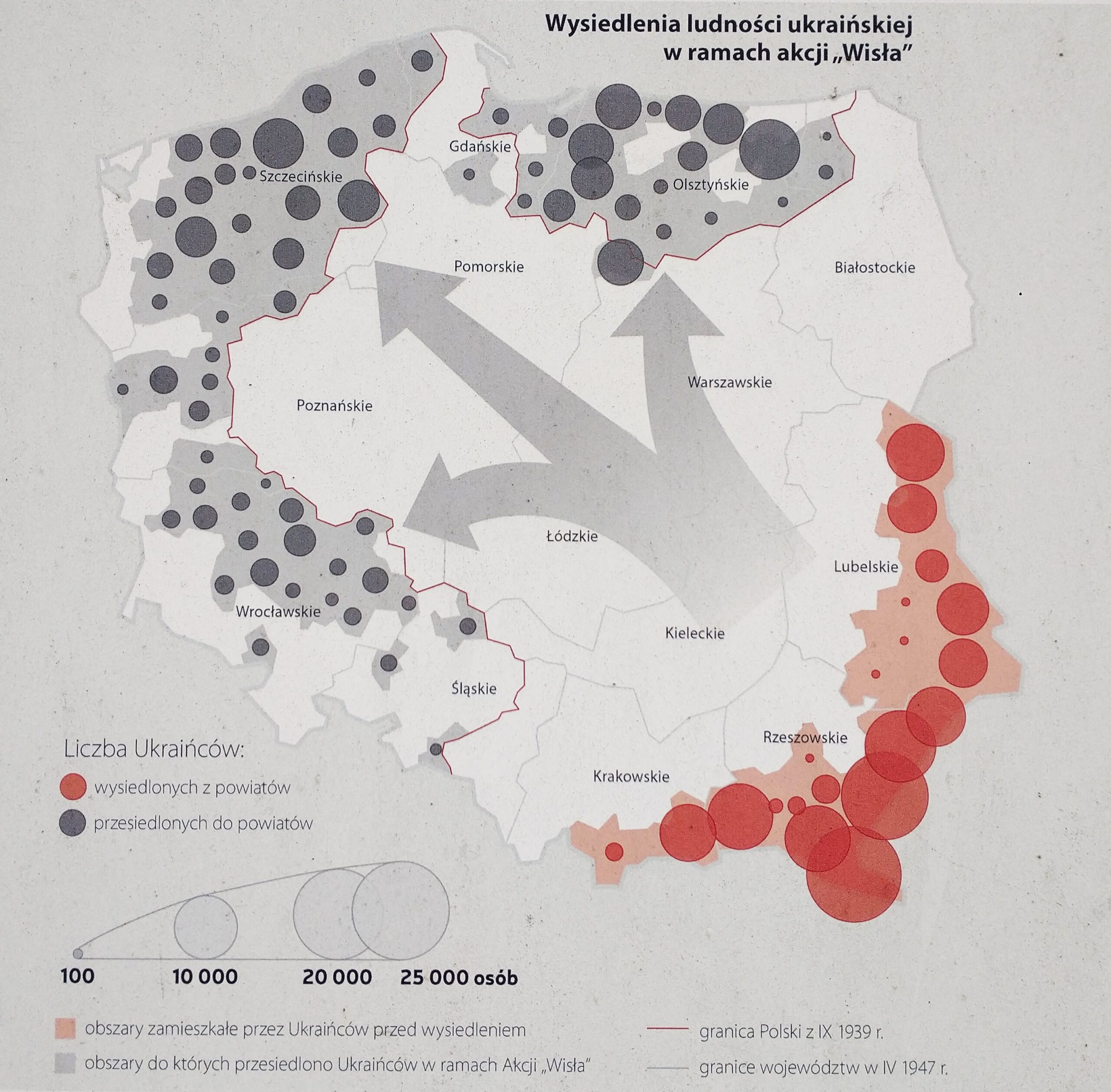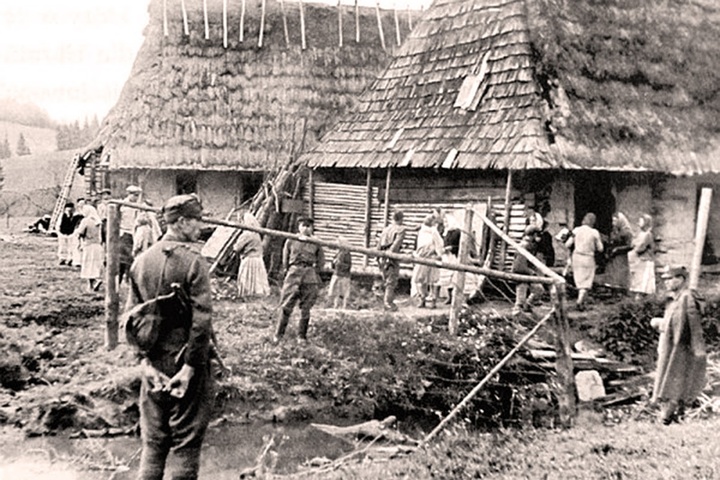A court has ordered the Institute of National Remembrance (IPN), a state body responsible for documenting and prosecuting historical crimes, to reopen an investigation into the forced resettlement of ethnic Ukrainians by Poland’s postwar communist authorities.
The episode, codenamed Operation Vistula and which took place in 1947, saw around 140,000 civilians – mostly Ukrainians – living in southeast Poland forcibly resettled in former German territories in the north and west that had been granted to Poland at the end of the war.
The action was part of efforts to suppress the Ukrainian Insurgent Army (UPA), a partisan formation that fought against the Soviet authorities. At the same time as the communist government carried out its operation in Poland, the Soviets conducted similar deportations in western Ukraine.

Map showing the forced resettlement of ethnic Ukrainians in 1947 from southeast Poland to former German territories gained by Poland after the war (source: MOs810/Wikimedia Commons, under CC BY-SA 4.0)
In November, the IPN announced that its prosecutors had decided to discontinue an investigation into Operation Vistula that had been requested by the president of the Union of Ukrainians in Poland, the head of the Lemko Union (representing the Lemko ethnic group), and one Ukrainian who was subject to resettlement.
The IPN said that it had established that there were “no grounds to conclude that the resettlement constituted a crime against humanity or a communist crime”.
“The investigation concluded that the evacuation of people of Ukrainian, Lemko and Polish nationality was preventive and protective, not repressive,” wrote the IPN. “It was carried out as a consequence of mass murders of the local population by units of the Organisation of Ukrainian Nationalists (OUN) and the UPA.”
The IPN argued that when carrying out those evacuations, “ethnicity was not used as a criterion”. It noted that around 20% of those resettled were ethnic Poles while some were Lemko, another ethnic group. It also said that “the evacuation was carried out in a humanitarian manner” and “no one was discriminated against”.
Sorry to interrupt your reading. The article continues below.

Notes from Poland is run by a small editorial team and published by an independent, non-profit foundation that is funded through donations from our readers. We cannot do what we do without your support.
However, the Union of Ukrainians in Poland challenged the IPN’s decision and the district court in Warsaw has now overturned it, ordering the IPN to reopen its investigation. The decision was made in July but has only now been announced by the IPN.
In a brief statement, the IPN said that the court had ordered it to carry out a “comprehensive assessment of the factual circumstances of the case using academic works by people with the greatest academic achievements in this field”.
The agency said it would comply with the order, though added that the prosecutor examining the case had already “familiarised himself with numerous academic works by Polish and foreign authors, which he presented in detail in the justification of the decision to discontinue the investigation”.
Śledztwo w sprawie akcji „Wisła” wróci do #IPN. Sąd uchylił decyzję o jego umorzeniu.https://t.co/L34Hd2B1YI pic.twitter.com/C0EtnbhqWA
— Dzieje.pl (@dziejepl) August 12, 2024
However, Grzegorz Motyka, a historian specialising in Polish-Ukrainian issues who is director of Poland’s Military History Bureau and a member of the IPN’s council, told the Polish Press Agency (PAP) that the decision is damning for the IPN.
“The court strongly criticised the decision to discontinue the investigation,” said Motyka. “It pointed out to the prosecutors a number of errors and a lack of elementary knowledge.”
“The IPN, which on many occasions rightly emphasises the criminality of the communist system, found a whole ocean of arguments when analysing the Operation Vistula to justify it, even though as many as 140,000 Polish citizens suffered as a result of this action,” he added.
Poland has removed another Soviet monument – the 41st since Russia's invasion of Ukraine.
Hundreds of local residents gathered to watch it being demolished, with many applauding as it collapsed https://t.co/KZ21qBfxMn
— Notes from Poland 🇵🇱 (@notesfrompoland) July 23, 2024
Motyka noted that the arguments used by the IPN in this case are “the same as was used by the communist authorities to justify Operation Vistula”. PAP reports that many other historians have criticised the IPN’s decision and the justification for it.
The IPN has been leading efforts in Poland in recent years to “decommunise” public spaces by removing symbols representing the communist period, such as street names and statues.
But there are also long-running tensions between Poland and Ukraine over the history of the UPA, which was responsible for the Volyhnia massacres during World War Two, which saw around 100,000 ethnic Polish civilians – mostly women and children – murdered by Ukrainian nationalists.
A memorial to victims of the Volhynia massacres, in which ethnic Poles were killed by Ukrainian nationalists during WW2, has been unveiled in Poland.
Several cities refused to host the monument, which depicts a baby being impaled on a Ukrainian trident https://t.co/OyOvQlAWkg
— Notes from Poland 🇵🇱 (@notesfrompoland) July 15, 2024
Main image credit: Unknown author/Wikimedia Commons (under public domain)

Daniel Tilles is editor-in-chief of Notes from Poland. He has written on Polish affairs for a wide range of publications, including Foreign Policy, POLITICO Europe, EUobserver and Dziennik Gazeta Prawna.



















